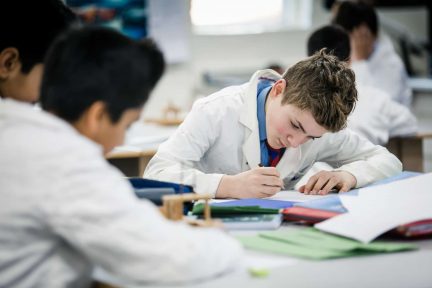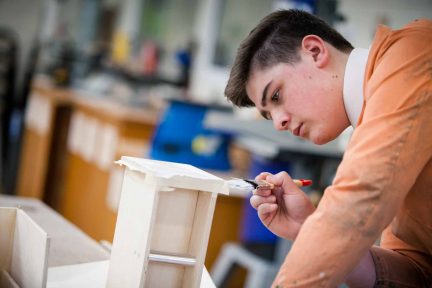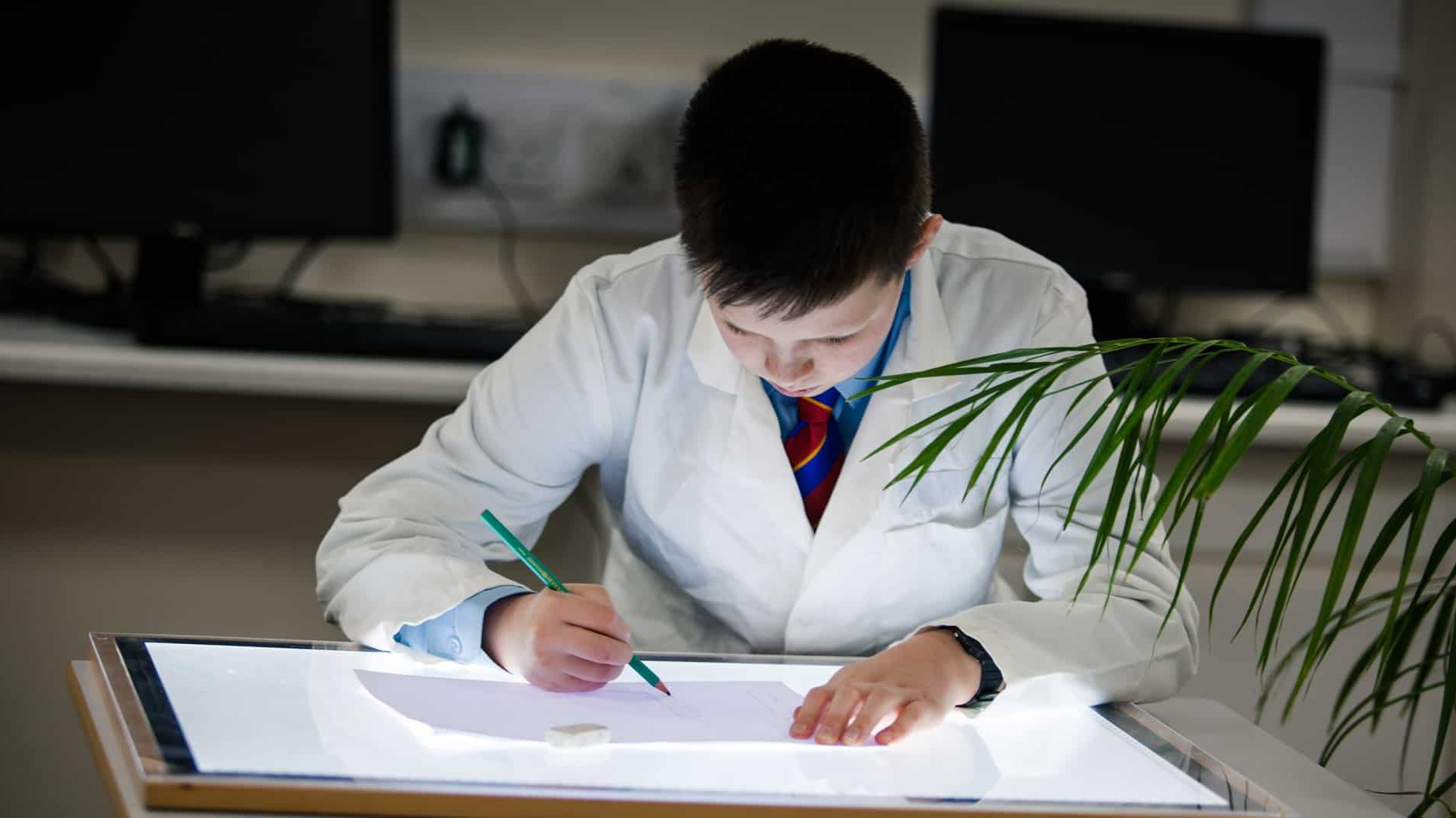Hear from Todd Moseley
Design and Technology continues to heavily influence the world around us and remains an exciting and engaging subject. It draws together skills from a broad range of disciplines including Physics, Mathematics, History and Art, and consequently requires pupils to develop their knowledge, skills, and abilities in a board range of areas.
Pupils are provided with many opportunities to develop these from Year 8 through to A Level. They learn to communicate their ideas through the manipulation of various media and will apply their problem-solving skills to create 3D prototypes from which to evaluate the success of their ideas.
Year 8
The pupils produce two practical outcomes in Year 8 – a light up key fob and a free-standing clock, both of which have been designed in the style of specific design movements.
The light up key fob focuses on Computer Aided Design (CAD), as the pupils use 2D design software to create their ideas before they are manufactured using the department’s laser cutter. The clock project encourages pupils to develop their confidence in the workshop, as they are introduced to a range of hand tools and machinery.
In both projects, pupils will learn various topics including Health and Safety, the design process, the material area of timbers, basic electronics, product analysis and graphical techniques for the effective communication of design ideas.
Year 9
The subject becomes optional from Year 9 and the pupils complete two projects should they continue to study the subject. Each of these are based on approximately 12-week periods to allow for their completion.
- Desk Tidy Project (Metal and Polymer Focus): This project allows the pupils to develop their Computer Aided Design and Manufacture skills using the software 2D Design and the laser cutter. They are further shown how to use the centre lathe to produce accurately turned components.
- Automaton Project (Timbers Focus): This project sees the pupils further develop their skills using a variety of workshop tools and equipment, including the scroll saw, disc sander and pillar drill.
In both projects, the pupils learn various topics in preparation for study at GCSE if they opt to study the subject at a higher level. These topics include Metals, Polymers, Mechanisms, Wood Joints, Composites and Materials Properties.


GCSE
At GCSE, the pupils continue to be assessed on the application of their skills and understanding of a wide range of theoretical topics.
We deliver Pearson Edexcel Level 1/Level 2 GCSE (9 – 1) in Design and Technology (1DT0), which is assessed on the following two units.
- Component 1: Core and Timbers Examination (Paper code: 1DT0/1F) – this is an externally assessed examination that is completed at the end of Y11. The paper covers a variety of topics for which the pupils are thoroughly prepared for in weekly theory lessons. These include Materials, the influence of New and Emerging Technologies, and Design Strategies.
- Component 2: Non Examined Assessment (Paper code: 1DT0/02) – this is an internally completed project but externally moderated, which involves the pupils producing an A3 portfolio and accompanying practical outcome over the course of approximately two terms. They respond to a given context by the exam board and are required to demonstrate investigative, designing, analytical, evaluative and practical skills.
A Level
Ideally suited, but not limited to, pupils who have completed the GCSE qualification, the A-level continues to develop upon earlier skills whilst encouraging pupils to consider the subject in real world contexts.
We deliver Pearson Edexcel Level 3 Advanced GCE in Design and Technology (Product Design) (9DT0). Like the GCSE, the qualification is assessed on two units:
- Component 1: Principles of Design and Technology (Paper code: 9DT0/01) – this is an externally assessed examination that is completed at the end of Y13. The paper covers a variety of topics for which the pupils are prepared for in weekly theory lessons. These include Features of Manufacturing Industries, Designing for Maintenance and a Cleaner Environment, and Current Legislation.
- Component 2: Independent Design and Make Project (Paper code: 9DT0/02) this is an internally completed project, but externally moderated, which involves the pupils producing a digital A3 portfolio and accompanying practical outcome. The pupils generate their own context to which to respond.
Working in small classes, pupils receive comprehensive support to help them realise their design ideas. They are taught various strategies that promote ‘good’ design practice and are encouraged to adopt an iterative design method for their projects. The department is thoroughly equipped and pupils are shown how they can use the facilities to manipulate a variety of material areas. This includes engineering machines such as centre lathes through to contemporary computer-controlled devices such as the laser cutter and 3D printer. These workshops are accompanied by individual computer suites which allow pupils to develop their skills using industry specific software.
Complimentary subjects are Physics and Mathematics and possible careers using Design & Technology include Product Design, Industrial Design, Automotive Design, Architecture, Engineering – Mechanical, electrical, civil, aerospace, materials etc., Construction/Project Manager and Computer Aided Design Technician.
Enrichment Activities:
The department offers a range of co-curricular activities that pupils from all year groups are encouraged to participate in. Lower down the school, Model Making and Upcycling Club provide opportunities to develop their skills beyond the classroom. Further up the school, Engineering Club is offered to those who study the subject at GCSE to allow pupils to enhance their skills using specifically the centre lathe and milling machine. Pupils in the Sixth Form are encouraged to enter competitions such as the Triumph Design Awards and can support departmental clubs as Subject Prefects. They also attend the Inspiring Minds workshop at Loughborough University to see where the subject can lead to following the Sixth Form.


